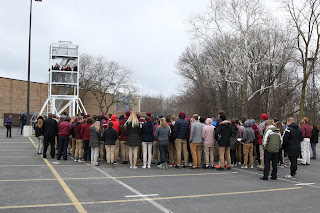Day 62: Some of us likes pasta...and Ralph Waldo Emerson...
My first summer job in high school was working at a local church's day-camp, supervising children and often being in charge of music. One of their favorite songs was called "The Pasta Song." The lyrics had the kids repeat after the song leader, and went something like this:
The song continues with the leader, me, pointing at each kid in the circle one at a time, and asking what that kid likes: puppies, pizza, recess, Miss Lizzy, etc. Then we substitute that item in the verse for "pasta." and sing it again, adding the old verses each time and ending on pasta. It was the best time waster song when waiting for lunch or the bus, because we could add as many verses as there were children, so long as the leader, me, remembered the correct order and nouns they gleefully shouted out. I got very good at this during my three summers at the camp, and today, this skill came in handy.
The AP reading for today was an excerpt from an essay on education by Ralph Waldo Emerson (1882). In it, Emerson details his vision of the ideal education process: one in which the student explores his or her passions, guided by a teacher equally as passionate, acknowledging the desired differences of students rather than forcing them to conform to one single ideal. We focused on one paragraph in particular:
I had all the kids close their eyes, and for five seconds, think about a passion they had. I then asked them to open them, and then one by one, I asked them what their passion was. "Music," "Marching Band," "cooking," "cars," "working out," "reading," "guitar," "drawing," "farming," "Mario Kart," and "showing pigs" (I work in an agricultural town). I then asked that, if an eight-year-old wanted to learn about music, or marching band, or cooking, or cars, or working out, (each time pointing at the corresponding student), or reading, or guitar, or drawing, or farming, or Mario Kart, or pigs, would you enjoy teaching them? Resoundingly, they said yes, they would enjoy sharing their passions with someone else; even if they themselves didn't feel like an expert, they felt they still had something to teach. It was a wonderful exercise to get them to understand Emerson's illustration of mutual pleasure in learning and teaching, and why that would be an educational ideal.
This is yet another reading that I assigned before officially reading it myself, but like so many other things I've read for this school year, it allowed me to fall in love with language all over again. While I am thankful I only have four and a half school days until a short Thanksgiving break, I do love my job.
Some of us like pasta (kids repeat: Some of us like pasta)
Some say "It's alright" (Some say "It's alright.")
Thank God for our uniqueness (Thank God for our uniqueness)
'Cus He made us right! ('Cus He made us right!)
'Cus it's pasta (Pasta!)
Pasta (Pasta!)
Pastaaaaaaaaaaaa (this can continue in an operatic note for sometime) THAT makes us one of a ki-yee-yi-yee-yind!
The song continues with the leader, me, pointing at each kid in the circle one at a time, and asking what that kid likes: puppies, pizza, recess, Miss Lizzy, etc. Then we substitute that item in the verse for "pasta." and sing it again, adding the old verses each time and ending on pasta. It was the best time waster song when waiting for lunch or the bus, because we could add as many verses as there were children, so long as the leader, me, remembered the correct order and nouns they gleefully shouted out. I got very good at this during my three summers at the camp, and today, this skill came in handy.
The AP reading for today was an excerpt from an essay on education by Ralph Waldo Emerson (1882). In it, Emerson details his vision of the ideal education process: one in which the student explores his or her passions, guided by a teacher equally as passionate, acknowledging the desired differences of students rather than forcing them to conform to one single ideal. We focused on one paragraph in particular:
The natural method forever confutes our experiments, and we must still come back to it. The whole theory of the school is on the nurse's or mother's knee. The child is as hot to learn as the mother is to impart. There is mutual delight. The joy of our childhood in hearing beautiful stories from some skillful aunt who loves to tell them, must be repeated in youth. The boy wishes to learn to skate; to coast, to catch a fish in the brook, to hit a mark with a snowball or a stone; and a boy a little older is just as well pleased to teach him these sciences. Not less delightful is the mutual pleasure of teaching and learning the secret of algebra, or of chemistry, or of good reading and good recitation of poetry or of prose, or of chosen facts in history or in biography.
I had all the kids close their eyes, and for five seconds, think about a passion they had. I then asked them to open them, and then one by one, I asked them what their passion was. "Music," "Marching Band," "cooking," "cars," "working out," "reading," "guitar," "drawing," "farming," "Mario Kart," and "showing pigs" (I work in an agricultural town). I then asked that, if an eight-year-old wanted to learn about music, or marching band, or cooking, or cars, or working out, (each time pointing at the corresponding student), or reading, or guitar, or drawing, or farming, or Mario Kart, or pigs, would you enjoy teaching them? Resoundingly, they said yes, they would enjoy sharing their passions with someone else; even if they themselves didn't feel like an expert, they felt they still had something to teach. It was a wonderful exercise to get them to understand Emerson's illustration of mutual pleasure in learning and teaching, and why that would be an educational ideal.
This is yet another reading that I assigned before officially reading it myself, but like so many other things I've read for this school year, it allowed me to fall in love with language all over again. While I am thankful I only have four and a half school days until a short Thanksgiving break, I do love my job.





:) I would have totally botched naming each passion back to the kids. That is a good life skill to have, Lizzie!
ReplyDelete